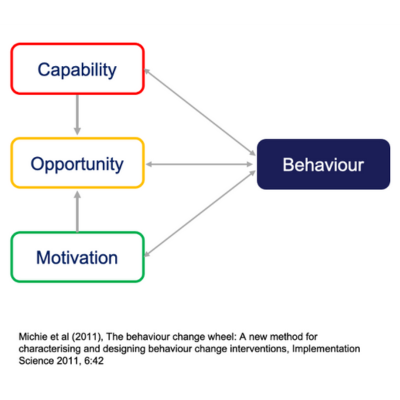(4 min read)
When it comes to you and me, or ‘the human factor’, tackling cyber security is all about psychology and behavioural science.
To create effective training we need to understand how people learn, how and why people act they way they do normally and how and why they react to certain situations.

So we apply behavioural models like the COM-B model, or MINDSPACE to create our interactive episodes and seminars. These are respected behavioural science models, and we’ve integrated their principles into Psybersafe to reinforce habit change, keep learners interested and engaged and get measurable results for organisations as their people go through the training.
COM-B Model of behaviour
Behaviour based cyber training that’s good for business
Our behaviour, our routines, and our habits can make us more vulnerable, but also help us be more secure against cybercrime. At Psybersafe, our focus on behavioural science means that we’ve created training that actually works in helping everyone stay safer. Our data shows that Psybersafe is very effective – beneficial to the individual learner and their organisation.
Progress of password construction in Psybersafe learners:

The learners on our platform adopt useful ways of doing things: small, easy changes to everyday actions that have a big impact on cyber security. The companies that adopt the training develop a safer, more secure group of employees and therefore a safer, more secure organisation. Good for the clients, good for the employees, good for business.
The role of psychology and behavioural science
The key is the application of psychology and behavioural science research such that people are willing to engage and pay attention, and actually DO things that help them.
We’re constantly looking for ways to improve our episodes and the way we communicate with our clients and learners. Learner feedback helps us to develop a continual improvement approach to our training design. Add to that the fact that we’re keeping up to date with psychology and behavioural science research, and you know that you’re getting an intelligent, practical training programme that is going to deliver the results you need.
Psybersafe founder Mark Brown says: “My interest in psychology started in 2008 when I worked with an executive coach to implement a particularly challenging project for the bank where I was working. This piqued my interest and led me to go off to do a coaching course. I developed a coaching style as a senior manager within my business, but felt I needed to do more. So I took a BSc degree in Psychology, to really get to grips with the fundamentals.”
“From there I started to focus on behavioural science. This ultimately led to the application of psychology and behavioural science on cyber security behaviour. And I continue to research, learn, and test ideas.”

You can apply this in your own life and work too.
We have a passion for this stuff and love to share it. A great approachable psychological angle is that of Dr Robert Cialdini. Robert Cialdini is the Regents' Professor Emeritus of Psychology and Marketing at Arizona State University, and the originator of the research and practice of the psychology of influence. He is well known for developing the 7 principles of Influence.
His books, Influence: the psychology of persuasion and Pre-suasion have sold millions of copies. He advised US President Obama’s election campaign and is lauded by luminaries like Nobel Prize winners Daniel Kahneman and Richard Thaler, leading financiers including Warren Buffet and Charlie Munger, Ogilvy vice-chairman Rory Sutherland and many more.
Mark is particularly interested in the work of Dr Cialdini. His 7 principles of influence are:
- Reciprocation
- Liking
- Social proof
- Authority
- Scarcity
- Consistency and commitment
- Unity
Some of these may seem obvious, but applying these effectively is a whole other ballgame.
And then there is also the amplifier, Contrast, which works with all of these principles. Being able to identify and use these principles properly – and ethically – allows you to build better relationships, move people in your direction and achieve your goals. We actively use these principles in Psybersafe to develop our programmes, and our learners.
Mark adds: “I love Dr Cialdini’s work - so much so that I’ve also become a founding member of the Cialdini Institute, where we train people to apply these principles – the stuff that’s not in the books. If it works for Psybersafe – which it does – I’d love to help you make it work for you too.”
If you want to know more, do feel free to reach out. And if you have not read the Dr. Cialdini’s book Influence, I wholeheartedly recommend it (and we don’t get paid for this recommendation, by the way).
Sign up to get our monthly newsletter, packed with hints and tips on how to stay cyber safe.
 Mark Brown is a behavioural science expert with significant experience in inspiring organisational and culture change that lasts. If you’d like to chat about using Psybersafe in your business to help to stay cyber secure, contact Mark today.
Mark Brown is a behavioural science expert with significant experience in inspiring organisational and culture change that lasts. If you’d like to chat about using Psybersafe in your business to help to stay cyber secure, contact Mark today.